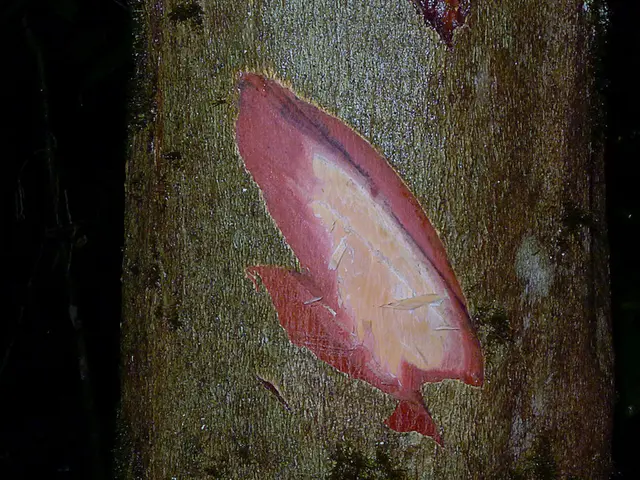Six DIY Solutions and Advice for Managing an Oily Scalp in Hair Care
Struggling with an oily scalp? You're not alone! This pesky condition can ruin your hair day, cause itching, dandruff, and even hair loss. Let's dive into the potential causes, prevention tips, home remedies, and hair care advice for tackling oily scalp.
What's behind an oily scalp?
An oily scalp usually occurs due to overproduction of sebum—a natural oil—by your hair follicles. Environmental factors, poor hygiene, hormonal shifts, stress, diet, and genetics might contribute to excessive sebum production[1][2].
Genetics
Your genes may play a part in the oiliness of your scalp. Some folks just have oilier skin naturally.
Hormonal Changes
Going through puberty, menstruation, pregnancy, or experiencing conditions like PCOS can crank up sebum production.
Stress
Up stress levels can trigger the sebaceous glands to produce more sebum.
Diet
Consuming excessive fatty or processed foods can impact sebum production. Opt for more fruits, veggies, and whole grains instead.
Poor Hygiene
Infrequent hair washing or inadequate cleaning lets oil and dirt accumulate on your scalp.
Harsh Hair Products
Ingredients like sulfates and certain chemicals can irritate the scalp and disrupt its natural balance.
Environmental Factors
Heat and humidity can enhance perspiration and oiliness.
Prevention Strategies
- Choose the right shampoo. Opt for a gentle, sulfate-free shampoo designed for oily scalps.
- Wash hair properly. Scrub the scalp thoroughly, but avoid overwashing. Aim for every other day or as needed.
- Adjust your diet. Cut back on oily, fried, and processed foods. Increase fruits, veggies, and whole grains.
- Avoid touching your scalp. Frequent scalp touching realigns oils and dirt from hands to the scalp.
- Manage stress. Practice relaxation methods like meditation or exercise to help control hormone-related oil production.
- Maintain good hygiene. Regularly clean combs, brushes, and hats to keep oil and bacteria at bay.
Home Remedies
- Apple Cider Vinegar Rinse: Combine apple cider vinegar with water and use it as a final rinse after shampooing to help restore scalp pH and reduce oiliness.
- Tea Tree Oil: Incorporate a few drops of tea tree oil into your shampoo due to its antimicrobial and oil-reducing effects.
- Clay Masks: Apply bentonite or kaolin clay masks to your scalp to absorb excess oil.
- Aloe Vera Gel: Try fresh aloe vera to soothe the scalp and regulate oil production.
- Lemon Juice Rinse: Mix diluted lemon juice to help control oil and reduce greasiness. But, be mindful to avoid overuse to prevent irritation.
- Natural Scrubs: Use oatmeal or baking soda mixed with water as a gentle scalp scrub to eliminate oil and dirt.
Taming an oily scalp requires a mix of targeted hygiene, dietary adjustments, stress management, and natural remedies to restore scalp harmony and promote scalp health. Stay beautiful, friends!
If you're dealing with concerns such as speech delay, low weight, frequent sickness, hyperactivity, low concentration, weak eyesight, improper sleep, pigmentation, pores, face marks, fine lines, lactation or similar issues, feel free to reach out on WhatsApp for solutions.
[1] Enrichment Data (Causes): https://www.medicalnewstoday.com/articles/323795[2] Enrichment Data (Prevention): https://www.verywellhealth.com/what-causes-an-oily-scalp-684544[3] Enrichment Data (Home Remedies): https://www.healthline.com/health/beauty-skin-care/homemade-oily-scalp-remedies#home-treatment[4] Enrichment Data (Environmental Factors): https://www.verywellhealth.com/what-causes-an-oily-scalp-684544[5] Enrichment Data (Diet): https://www.stylecraze.com/articles/ways-to-treat-an-oily-scalp/[6] Enrichment Data (Stress): https://www.stylecraze.com/articles/ways-to-treat-an-oily-scalp/[7] Enrichment Data (Poor Hygiene): https://www.stylecraze.com/articles/ways-to-treat-an-oily-scalp/[8] Enrichment Data (Harsh Hair Products): https://www.healthline.com/health/beauty-skin-care/homemade-oily-scalp-remedies#home-treatment[9] Enrichment Data (Product Information): https://storytel.com/in/en/blog/2021/05/28/kids-teens-daily-nutrition-chocolate-spread/[10] Enrichment Data (Kids & Teens Immunity Boost Chocolate Spread): https://storytel.com/in/en/blog/2021/05/28/kids-teens-immunity-boost-chocolate-spread/
Nutrition plays a role in maintaining the health and well-being of your scalp, as consumption of whole grains, fruits, and vegetables can support proper brain development while reducing the production of sebum. Proper care of your skin, such as incorporating clay masks, aloe vera gel, and Apple Cider Vinegar rinses in your hair care routine, can contribute significantly to scalp health and growth and development. The science of hair care, including understanding environmental factors, the impact of harsh hair products, and the role of genetics, will assist you in finding the best solutions for dealing with an oily scalp.







